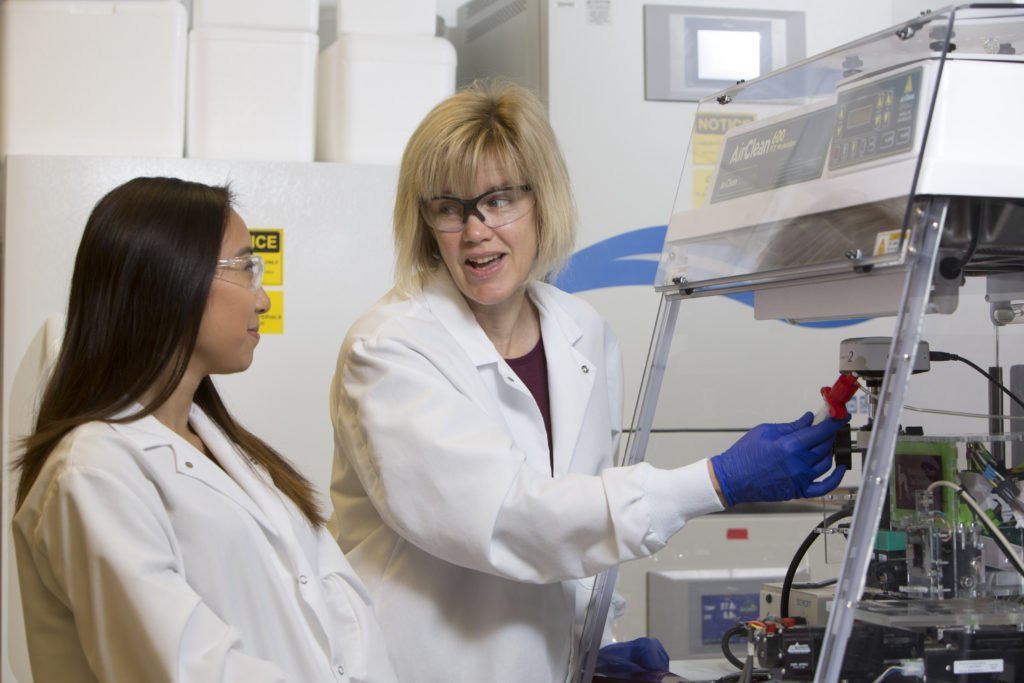A team of UGA researchers has developed a set of learning modules to provide customizable mentoring for students interested in learning how to succeed in a research setting. Called “Research Experience and Mentoring,” the online training materials (http://www.eqpoint.info/) include resources for both mentors and mentees.
According to Karen Burg, Harbor Lights Chaired Professor in the School of Veterinary Medicine and the lead scientist behind the modules’ development, they were created as a broadly useful tool in helping aspiring researchers learn best practices and professional skills. Many existing training resources are either scattered across the web, or are too specific to work for everyone, or cannot be fused directly to research, Burg said.
“It doesn’t matter if you are a chemical engineer or a pharmacy mentor, you’ll feel comfortable pulling one of these modules and being able to adapt it to your own lesson plan and research,” Burg said.
The modules cover various topics such as writing standard operating procedures, experimental design, networking and communication skills. Each module comes with a set of learning outcomes and guides both for mentors and mentees, providing a 360-degree viewpoint, according to Burg.
“If you are only giving input to mentees, then you’re reliant on the mentors somehow knowing how to teach or train in a productive way,” Burg said. “You need to assist the mentees, but you also need to assist the mentors. It’s a handshake between the two.”
Taylor Ng, a fifth-year biochemical engineering student who used the modules, said the experience covers topics such as interviews and writing resumes that are not usually taught in formal classes. Ng also said the modules are broad and would be helpful to students from different majors.
“The modules are relatable to everyone, whether you’re a business major or a science major,” Ng said. “The topics are definitely overarching and [useful] for everybody.”
The researchers first tested the REM modules during a pilot phase, with undergraduate students from different majors conducting veterinary biomedical research at UGA, as well as students of one of Burg’s own former students who is currently a faculty member at Clemson University. Feedback from students helped improve and refine the modules.
For each topic, users of the REM modules will find a section on learning objectives that highlights skills the user should acquire after finishing the module. This approach links each module to a defined list of intellectual outcomes, Burg said. In addition, the resources for mentors and mentees include detailed instructions on how to conduct the module and also provide supplementary material, such as external links, additional exercises or PowerPoint presentations, and additional tips.
The development of the modules was driven by Burg’s personal experience during graduate school, where she said she struggled with finding mentoring resources that she could use.
“Mentoring is a skill that must be developed. It always seemed like an area where we could do better — a better job of helping people learn how to mentor,” Burg said.
Burg said she hopes the modules will continue to evolve and become a community resource, where different groups refine the modules to suit their specific situations.
The modules were developed as part of an NSF Chemical, Bioengineering, Environmental and Transport Systems (CBET) grant that focused on 3D tissue systems. Burg highlighted the significance of funding educational components of research projects.
“The grant actually funded both the technical work, as well as the module development,” Burg said. “It’s really neat that NSF saw the value of professional skills to research and creative inquiry success.”
